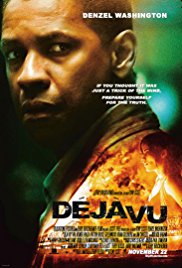 “Déjà Vu” is a near-mirror image of most Jerry Bruckheimer popcorn flicks: the logic, by and large, works (which is really saying something for a time-travel movie), but watching it unfold isn’t terribly exciting. Compare that to, say, “The Rock” or “Con Air,” which are brain-dead but also tons o’ fun. Maybe director Tony Scott got so wrapped up in the groovy new F/X shots the movie employs, and how he was going to serve up some stunning split-screen imagery that no one’s ever done before, that he lost track of some of those other important ingredients to making a good movie, like acting and pacing.
“Déjà Vu” is a near-mirror image of most Jerry Bruckheimer popcorn flicks: the logic, by and large, works (which is really saying something for a time-travel movie), but watching it unfold isn’t terribly exciting. Compare that to, say, “The Rock” or “Con Air,” which are brain-dead but also tons o’ fun. Maybe director Tony Scott got so wrapped up in the groovy new F/X shots the movie employs, and how he was going to serve up some stunning split-screen imagery that no one’s ever done before, that he lost track of some of those other important ingredients to making a good movie, like acting and pacing.
Denzel Washington plays Doug Carlin, a New Orleans ATF agent investigating the horrific bombing of a steamboat filled with US Navy sailors and their families. While filtering through the casualties, he stumbles upon the body of a girl named Claire (Paula Patton), though the circumstances surrounding her death lead Doug to believe she is not a victim of the bombing but a clue to the bomber’s identity. Enter FBI Agent Pryzwarra (Val Kilmer), who shows Doug a top-secret government program that allows them to lock in on any place in the world four days in the past. As they follow Claire’s life, Doug doesn’t just want to find the man responsible for the bombing; he wants to save Claire’s life. But can he? Will the rules of the time-space continuum permit such a thing?
That last question alone takes up nearly ten minutes of exposition in the scene where Doug is shown the technology that permits the Feds to look back in time. Ten, long, minutes. Every time Washington said “Let me get this straight” or “Are you saying that…,” I thought to myself: college kids across the country have their next movie drinking game. There’s certainly a story here, but it gets continuously sidetracked by the gimmicks. Our jaws are supposed to drop at the possibility of a bunch of satellites having the ability to provide a very revealing window into the past (one that, for the sake of convenience, cannot be replayed or sped up, though it can be recorded in tiny increments), and again when Doug goes into the field and uses this new technology in mind-boggling ways. And maybe your jaw will drop when those things happen, but a better approach would have been to move the story along, rather than getting bogged down in the minutiae.
Then there’s the ending, which works on one level but doesn’t work on another (to say more would mean spoiling everything). Movies that are based on time travel all have those paradoxes, and this one is no exception. In fact, the cynical, no-dry-eyes-in-the-house part of me saw a fantastic, if brutal, ending to this movie, and was disappointed that they were thisclose to realizing it, only to go in another direction. Unlike “Stranger than Fiction” – and I’m totally stealing the end of the great Roger Ebert’s review for this line – the compromise here was not the choice of the characters, but the storytellers. They probably couldn’t sell the script any other way, of course, but they should know that other options were in front of them, much like they were for the characters in their story.
Props to “Déjà Vu” for trying to take the typical Bruckheimer action movie and make it smarter, but they should have focused on what makes a Bruckheimer movie a Bruckheimer movie, and it ain’t smarts. No one goes to see these movies to be challenged in any way; they see them to be entertained, and that’s where the film loses its way. Film buffs will surely berate me for “lowering the standards” by accepting Bruckheimer’s movies for what they are, but let’s get real for a second. The standards are already low, and it’s not Bruckheimer’s fault. I call out his junk when I see it (“Armageddon,” “Pirates of the Caribbean: Dead Man’s Chest,” “Kangaroo Jack,” “Bad Boys” and its sequel), and while this isn’t art, it isn’t junk, either. But it’s also not what it could have been. Give me access to the technology that’s in this movie, and I’ll make a better movie. Maybe not the most likable movie, but a better one.
 (3 / 5)
(3 / 5)



